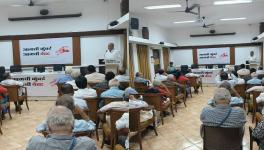Tribals Accuse Modi Govt of Curtailing Rights in Chhattisgarh Steel Plant Sale

Representational Image. Image Courtesy: NDTV
New Delhi: The Modi government is allegedly curtailing the rights of tribal communities in Chhattisgarh by attempting to privatise a Rs 24,000-crore steel plant – even before it has begun operations – for which a large parcel of land had been acquired on the grounds that it would serve a public purpose. Around 1,980 acres of land had been acquired by the public sector enterprise National Mineral Development Corporation (NMDC) to build the Nagarnar Steel Plant in the Bastar area, where special constitutional and legal provisions are applicable for safeguarding the rights of tribal communities.
No consent has been taken from tribal communities affected by the project, however, before deciding to sell the entire stake of the union government in it. As per reports, preliminary bids for the strategic sale of the steel plant are likely to be invited by the end of the current financial year. In October 2020, the Cabinet Committee on Economic Affairs (CCEA), which is headed by Prime Minister Narendra Modi, had given ‘in-principle’ approval for the demerger of the steel plant from NMDC.
The Committee had also approved the strategic disinvestment of the steel plant, following the demerger, by selling the union government’s entire stake in it to a strategic buyer.
Bastar in Chhattisgarh, where the 3 million tons per annum (MTPA) steel plant is under construction, is enlisted in Schedule V of the Constitution of India owing to its preponderance of tribal population, thereby conferring local communities of the district with special rights over land.
“Any attempt at strategic sale or disinvestment of a public enterprise in an area that has pre-dominantly tribal population violates the provisions of the PESA Act, 1996 [Panchayats Extension to Scheduled Areas (PESA) Act, 1996]. Prior consent of project-affected tribal communities and the Scheduled Tribes is essential through Gram Sabhas before going ahead with the strategic sale of the power plant because this decision will have definite bearings on the livelihoods of those communities,” said Rebbapragada Ravi, Executive Director of Samata, a social justice organisation working for the rights of the tribal people of Andhra Pradesh and neighbouring states.
The very rationale of the PESA Act, 1996 is to preserve tribal population in areas categorised as Schedule V from exploitation with the active involvement of Gram Sabhas, which are essentially councils comprising all adult members of villages in which they are constituted. Gram Sabhas are the lowest and most basic rung of participatory democracy in the country. The local administration has to mandatorily seek the consent of Gram Sabhas before acquiring land for any purpose. The PESA Act empowers Gram Sabhas to manage and protect common properties, including land, forests and forest produce. The Act also empowers Gram Sabhas to protect the traditions, beliefs and culture of local tribal communities.
"Land was acquired from tribal communities to construct a steel plant in the public sector because it would have certain socialistic objectives to fulfil. Before going ahead with the decision to privatise the project, there was no attempt either to examine if it will have any impact on the socio-cultural norms and practices of the local tribal communities," added Ravi.
As per its district census handbook, Bastar boasts of as many as 42 different Scheduled Tribe communities. The proportion of Scheduled Tribes in the total population of the district is an overwhelming 65.93% as per Census of India data for the year 2011. There was an increase of 0.51 percentage points in the proportion of the Scheduled Tribe population during the decade 2001-2011. The literacy rate of the district of Bastar is poor and well below the national average, that is, 54.4%, as per the Census of India data for 2011.
The economy of Bastar is primarily dependent on land: agriculture is the main source of livelihood for the majority of the population in the district. Following agriculture, the collection of forest produce is the second main occupation of the population in Bastar.
The steel plant is being constructed by taking over land and other resources, which earlier were the source of livelihood of local tribal communities. But the question has not been settled yet as to whether the affected population will be guaranteed employment in the project vide positive discrimination for disadvantaged sections of the population through the union government’s policy of job reservations in the public sector. As a public sector unit, the steel plant was bound to reserve a certain proportion of its jobs for candidates belonging to Scheduled Tribes, Scheduled Castes and Other Backward Communities.
“Privatisation of the public sector unit will close the doors of reservations in employment for tribals. The present disinvestment policy of the union government also provides no guarantee for existing employees, including tribals, to continue being employed. Reservations not only provide employment for tribals but also have the effect of socially empowering them,” retired bureaucrat EAS Sarma, a 1965-batch IAS officer, told the NewsClick.
Sarma has written to the central government and the Chhattisgarh government earlier this month, highlighting that the proposed privatisation of the steel plant, for which land had been acquired in Bastar for a "public purpose project" is legally unsustainable.
“Land was acquired for the Nagarnar Steel Plant under the erstwhile Land Acquisition Act, 1894, which stipulated that the acquisition was exclusively for a “public purpose”, defined under that legislation as for a corporation wholly owned and controlled by the government. In view of it, that land cannot be transferred to a private company. Strictly, if the Nagarnar unit is sold to a private company, the land in question should revert to the state government and preferably be restored to the original tribal landholders. Indirectly, this will render the privatisation idea itself legally unsustainable. As per the disinvestment policy adopted by the National Democratic Alliance (NDA) government, non-core land of the unit, which includes the surplus land, will be “monetised” to private agencies, which as explained above is legally not permissible,” Sarma added.
A set of queries were emailed by this correspondent to the Department of Investment and Public Asset Management (DIPAM), which handles disinvestment matters for the union government, asking, amongst other things, what provisions have been put in place to ensure that land rights of tribals are not compromised in the process of privatisation of the steel plant. A question has also been asked as to what safeguards are being put in place to ensure that disadvantaged communities of the region mandatorily find employment in the project following its privatisation.
The questionnaire has also been sent to cabinet minister Nirmala Sitharaman, who heads the Union Finance Ministry under which the DIPAM functions. No response had been received at the time that this article was published.
Local communities of the region have been waiting for several years to accrue the benefits of the steel plant, which is being established after the takeover of their lands. The central government is going ahead to invite preliminary bids for the strategic sale of the steel plant despite the Congress government of Chhattisgarh showing its willingness to buy the project. In December 2020, soon after the union government had given its in-principle approval to disinvest the project, the Chhattisgarh state legislative assembly had even unanimously adopted a resolution on the state’s willingness to buy the project in case the central government goes ahead with its disinvestment.
The disinvestment proposal is being pushed by the Modi government in the face of massive opposition by trade unions too. In November last year, various trade unions had come together in New Delhi to hold a two-day protest demonstration on Parliament Street against the proposed privatisation of the steel plant.
“It goes to the credit of the Congress party that the Panchayati Raj system was extended to tribal areas through the enactment of legislation in the year 1996. But disinvestment of the Nagarnar Steel Plant is a classic case of how disadvantaged tribal communities in the country are being shortchanged of the rights granted to them through this legislation behind the façade of economic liberalisation,” Arvind Netam, a former Congress MP from the Kanker Lok Sabha constituency (now in Chhattisgarh) of undivided Madhya Pradesh.
Netam also alleged that the ruling dispensation is following a no-holds-barred policy of crony capitalism in which public sector units, which are assets of the public in the hands of the government, are being sold for no particular reason. “In this process, tribal communities are being dispossessed of their very basic rights over Jal (water), jungle (forests) and jameen (land). The ruling dispensation should seriously consider the long-term outcomes of applying this lopsided policy in a tribal area,” he added.
The writer is an independent journalist.
Get the latest reports & analysis with people's perspective on Protests, movements & deep analytical videos, discussions of the current affairs in your Telegram app. Subscribe to NewsClick's Telegram channel & get Real-Time updates on stories, as they get published on our website.
























